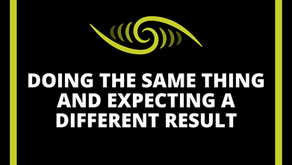Many organisations look at their spend with Māori and Pasifika businesses and think ‘oh crap, we really don’t spend a lot of money with these businesses’. We must do something to change this.
But, often ‘doing something’ usually turns into doing the same thing as usual and somehow expecting things will change. That's generally not how this works.
If a government agency has always put opportunities up on GETS and has experienced very low uptake (if any) from Māori and Pasifika businesses - then guess what...putting another listing on GETS probably isn't going to change that.
If a corporate company has always invited three businesses to a closed process and ‘can’t rock the boat’ by including anyone else - they’re not going to magically engage a Māori and/or Pasifika business.
If panels have low Māori and Pasifika business participation, then using panels as the sole source of businesses is going to result in low Māori and Pasifika business spend.
Do things differently.
The point is things actually need to be done differently to get a different result. Here are just a few suggestions that we have seen create change.
Approach to market
If your approach to the market traditionally hasn’t engaged Māori and Pasifika businesses, try a different approach.
Explore what a closed tender to Māori and Pasifika businesses could look like
Explore what a direct award could look like
Explore opportunities to unbundle packages
Explore set asides for work that is low risk with high Māori and Pasifika supply
Explore inviting at least one Māori and Pasifika business to be part of your process
Relationships with Māori and Pasifika businesses
If there are no relationships with Māori and Pasifika businesses, then build them!
Build relationships with Māori and Pasifika business before putting documents out to the market, so it’s not a cold engagement by someone they have never heard of Hold meet and greet events with real opportunities
Meet with Māori and Pasifika businesses to gauge their capability and capacity
Think about specific supplier briefings to engage with more diverse businesses
Give mana to what you value
If you talk about supplier diversity as a key outcome for the organisation, give it proper weighting in your evaluation. Give it mana.
Change your weightings to value supplier diversity and social outcomes
Create a supplier diversity policy statement
Mandate supplier diversity for opportunities of cultural significance or where cultural expertise is needed e.g working on Marae, Kura Kaupapa, use of Te Reo, working with iwi
Think outside the box
Think about how you can innovate within the procurement rules of your organisation.
Build policies and rationale that allow for exceptions to pilot new innovative approaches
Create an environment that allows for fail fast testing and learning reflections
Use your rules as an enabler rather than a barrier; how are you creating fair and transparent processes that enable Māori and Pasifika businesses to compete
Reduce barriers to entry
If businesses give feedback about significant barriers stopping them from competing, question why they are there in the first place and where possible break down those barriers.
Explore whether bonds and retentions could be decreased or dropped if they are barriers
Explore whether your organisation could take on some of the liability if insurances or risk liabilities are overly cumbersome
Explore reducing tender documents and ammending them if they are barriers
Avoid jargon and complicated messaging in your tender documents - keep it simple
Be specific and intentional
Being intentional is key to success. It’s very difficult to accidentally diversify your supply chain if you’re not already doing it. You need to be specific and intentional in your procurement activity. This ideally goes from the business case phase through to asking for additional outcomes in the tender documents and weighting these outcomes with mana. Practically, this could be setting supplier diversity targets, having a supplier diversity policy and specifically asking suppliers whether they are a verified Māori and/or Pasifika business.
Make it fair
Supplier diversity is not about giving Māori and Pasifika businesses a handout, it's about looking for ways to better engage them and allow them to fairly compete for contracts.
If a Buying organisation has always engaged with two companies that are large national companies with incredible track records with the company, inviting a small Māori business in and expecting them to compete is completely unrealistic. In these instances, it could be thinking about how larger packages could be unbundled and only inviting businesses of the same size and scale to compete through a competitive closed tender.
Time to make a change
Doing things differently doesn’t mean you are being unfair or anti-competitive, in fact it's quite the opposite. Good procurement already expects that you are thinking of additional value, doing market scanning and opening the door for alternative solutions and suppliers.
Developing a strong Māori and Pasifika supply market that ensures a greater diversity of suppliers can bid for contracts is not anti-competitive, but pro-competitive, ensuring that the supply markets remain dynamic and diverse.
It's important to understand that this is not a handout - all businesses still need to be assessed, compete and win based on their own merits. In summary, the message is simple - if you want a different result, you’ve got to do something differently. What can you change now?
DOWNLOAD ARTICLE HERE


